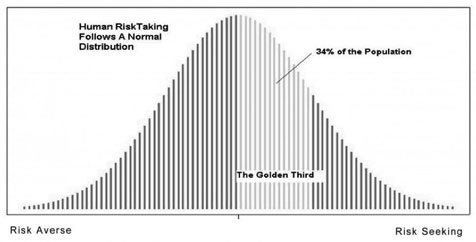According to the Oxford Dictionary the word ‘risk’ means, “A situation involving exposure to danger”. Realistically, this could range from something as simple as falling over when walking, to losing control of your bike, or even crashing your car; the list of possible dangers are endless.
Exploration in to the world of risk has shown that you can measure what kind of risk taker you are, much like an IQ score. A study with a large group of people will show that, on average, people are neither as low as a number one (averse to taking any risk as small as stepping out the front door) or are extreme dare devils (such as the famous Evel Knievel).
William Gurstelle, the Ballistics and Pyrotechnics Editor for Popular Mechanics Magazine has carried out years of research on risk aversion. It is his belief that a person’s inclination to risk-taking has a profound impact on their happiness and life satisfaction. This ties in closely to the endless asked question of whether we make our own luck in life.
Gurstelle’s research looked at the two extremes of risk-taking and found that the average person lies right in the middle. However, just to the right of the middle towards the Evel Knievel side of risk-taking lies what he calls the “Golden Third”. William Gurstelle argues: “People who fall into the Golden Third, who are more willing to take risks and capitalize on opportunities, experience the highest index of life satisfaction and fulfillment”.

How Risk Taking Can Impact Your Life & Happiness
THE GOLDEN THIRD
Once you enter the golden third, there is a fine balance in staying there. Advanced Riskology founder, Tyler Tervooren is committed to helping people utilise smart risk opportunities and live better lives through uncertainty. Tyler has granted us his time for an interview to share his insight and advice. The information provided should be able to guide you through the process of making good risks in everyday life.
“We fear that which we don’t understand.”
When you take a risk, like applying for a new job, that doesn't lead to the desired outcome and you don’t understand why you didn't get it, especially if you have all of the relevant qualifications, you may be tempted to give up and stop trying again.
“Unless you understand how to take smart risks, this will be most people’s experience with it”. However, spend the time to research and understand what you are about to get yourself into, and then find a way to “dip your toe in”. Validate your big risk by taking smaller, less life altering ones first.
The fear factor to taking risk is likely to stay, as Tyler states: “as humans, we will stagnate unless we consciously push ourselves”.
Continuous discipline of the mind is essential to knowing how to take smart risks. As it is a fundamental part of the human experience, the more you practice and do it, the more it becomes natural: “Children learn to crawl before they walk. They walk before they run, and they run before they drive cars, fly aero planes, so on and so forth. At each step, there’s a fear barrier that has to be overcome”. With many sequences of successes before “you learn something and adjust for the next one which, of course, makes it that much scary to do”.
He highlights:
“We tend not to notice that we’re good at something until we see others around us struggling with it”.
Even small moves in this area of your life will be uncomfortable, but if anything else Tyler assures that it simply means that “you’re headed in the right direction”.
Always remember there it is a fine art to stating balanced and living in the ‘Golden Third’ and straying into the reckless stage of many thrill seekers. A prime example of this in today’s world would be the guys from Jackass or Dirty Sanchez.
Janey offers to share some advice on how to manage risk-taking effectively:
“People must reflect on their actions and assess the outcomes consciously. Without feedback on your actions you can become narcissistic and uncivilised. When the consequences of your actions bare no meaning to you, you can become destructive to the people around you”.
Conclusion
Know that risk-taking is an important part of development and it is essential to maintain a level of curiosity, motivation and desire to move forward. However, always maintain a conscious awareness of your actions through active reflection and you will learn to enjoy the process of smart-thinking.
keep in touch & like the page while there! I will always reciprocate

No comments:
Post a Comment